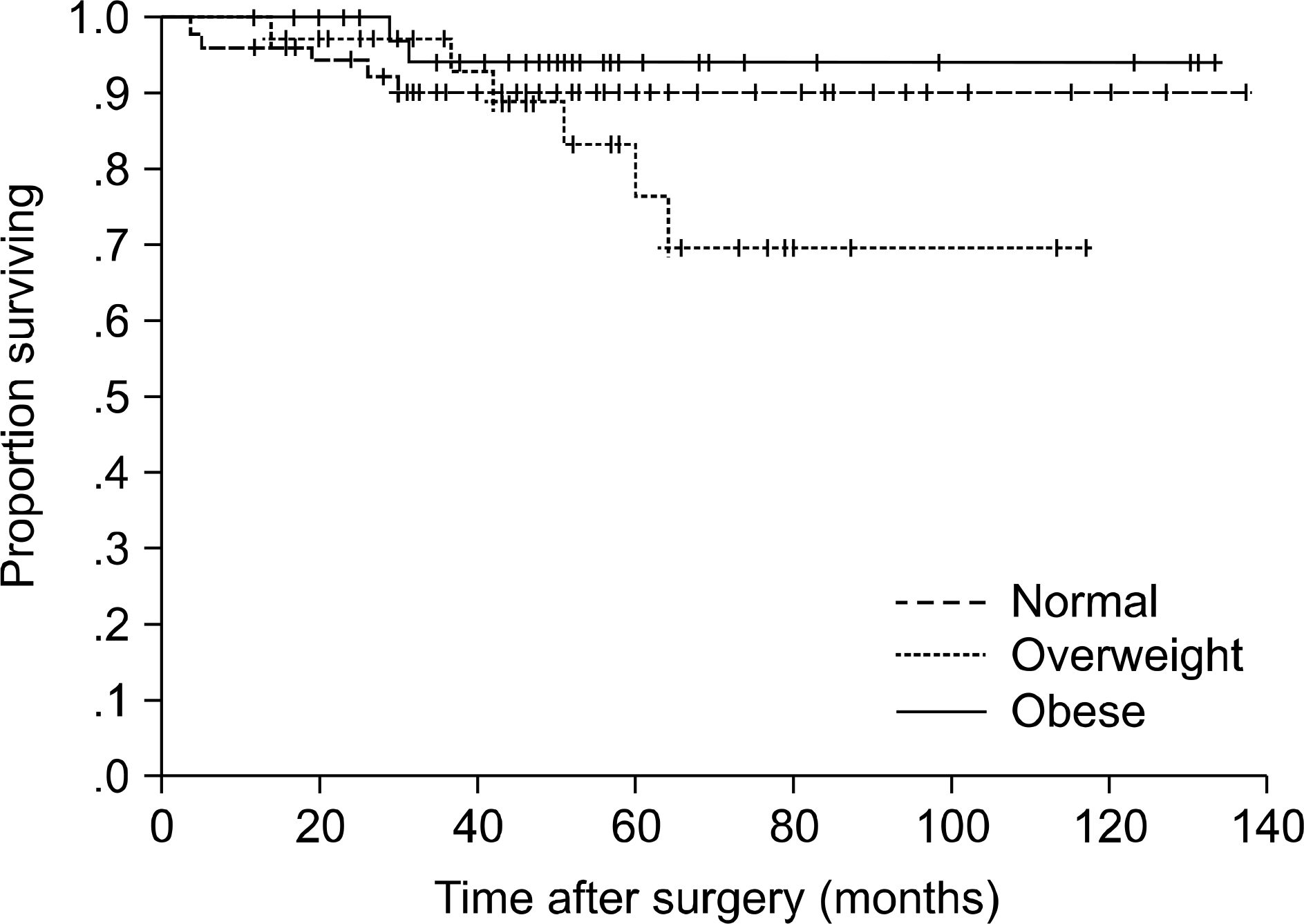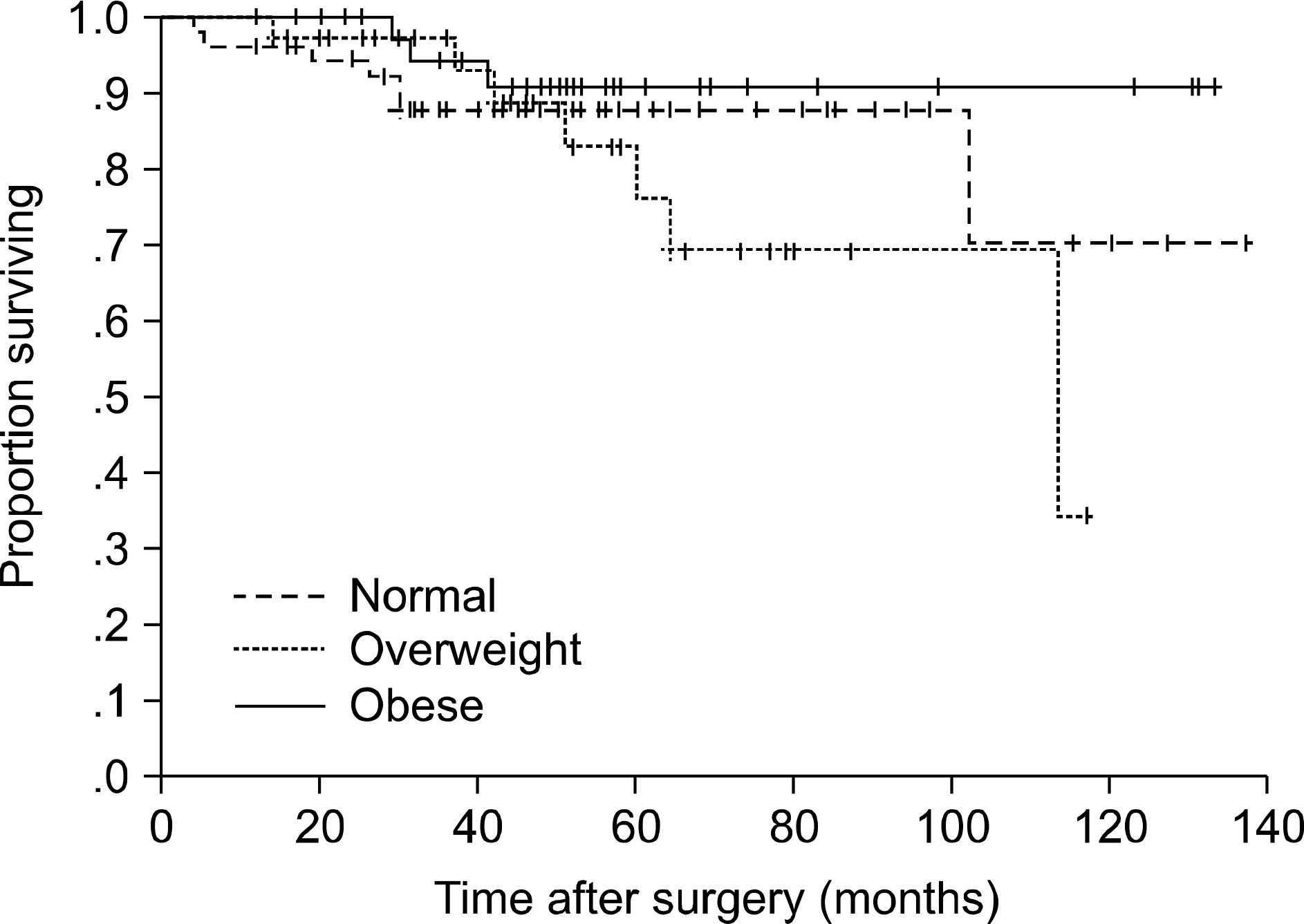Korean J Urol.
2008 Jul;49(7):579-584.
Impact of Body Mass Index on the Prognosis of Patients Undergoing Radical Nephrectomy for Non-metastatic Renal Cell Carcinoma
- Affiliations
-
- 1Department of Urology, Ajou University School of Medicine, Suwon, Korea. sejoong@ajou.ac.kr
Abstract
-
PURPOSE: This study was performed to investigate the association between body mass index(BMI) and prognosis in patients undergoing radical nephrectomy for non-metastatic renal cell carcinoma(RCC).
MATERIALS AND METHODS
We reviewed the records of 129 patients who underwent radical nephrectomy for non-metastatic RCC at our institution and whose BMI data were available for analysis. Patients were grouped according to BMI based on the Asia-Pacific criteria for obesity as normal (18.5-22.9kg/m2), overweight(23-24.9kg/m2), and obese(>or =25kg/m2). Demographic and clinicopathologic parameters were analyzed.
RESULTS
On the basis of BMI, 54 patients(41.9%) were categorized as normal, 37(28.7%) as overweight, and 38(29.4%) as obese. The three groups were not significantly different with respect to age, smoking history, presenting symptoms, tumor histology, tumor size, T stage, or grade, except sex. The cancer-specific and disease-free survival rates at 5 years were 89.9% and 87.7%, respectively, for normal patients, 76.3% and 76.3%, respectively, for overweight patients, and 94.1% and 90.8%, respectively, for obese patients, with no significant differences noted among the groups. Univariate analysis identified presenting symptoms, tumor size, T stage, and grade as significant prognostic factors for cancer-specific survival, whereas multivariate analysis indicated that presenting symptoms, tumor size, and T stage were independent prognostic factors. BMI was not a significant prognostic factor for cancer-specific survival.
CONCLUSIONS
Our findings suggest that BMI does not adversely affect the prognosis of patients undergoing radical nephrectomy for non-metastatic RCC.
Keyword
MeSH Terms
Figure
Reference
-
1.Rini BI., Rathmell WK., Godley P. Renal cell carcinoma. Curr Opin Oncol. 2008. 20:300–6.
Article2.Lipworth L., Tarone RE., McLaughlin JK. The epidemiology of renal cell carcinoma. J Urol. 2006. 176:2353–8.3.Calle EE., Rodriguez C., Walker-Thurmond K., Thun MJ. Overweight, obesity, and mortality from cancer in a prospectively studied cohort of U.S. adults. N Engl J Med. 2003. 348:1625–38.4.Moyad MA. Obesity, interrelated mechanisms, and exposures and kidney cancer. Semin Urol Oncol. 2001. 19:270–9.5.Chow WH., Gridley G., Fraumeni JF Jr., Järvholm B. Obesity, hypertension, and the risk of kidney cancer in men. N Engl J Med. 2000. 343:1305–11.
Article6.van Dijk BA., Schouten LJ., Kiemeney LA., Goldbohm RA., van den Brandt PA. Relation of height, body mass, energy intake, and physical activity to risk of renal cell carcinoma: results from the Netherlands Cohort Study. Am J Epidemiol. 2004. 160:1159–67.
Article7.Pischon T., Lahmann PH., Boeing H., Tjønneland A., Halkjær J., Overvad K, et al. Body size and risk of renal cell carcinoma in the European Prospective Investigation into Cancer and Nutrition (EPIC). Int J Cancer. 2006. 118:728–38.
Article8.Flaherty KT., Fuchs CS., Colditz GA., Stampfer MJ., Speizer FE., Willett WC, et al. A prospective study of body mass index, hypertension, and smoking and the risk of renal cell carcinoma (United States). Cancer Causes Control. 2005. 16:1099–106.
Article9.Samanic C., Chow WH., Gridley G., Jarvholm B., Fraumeni JF Jr. Relation of body mass index to cancer risk in 362,552 Swedish men. Cancer Causes Control. 2006. 17:901–9.
Article10.Bergström A., Hsieh CC., Lindblad P., Lu CM., Cook NR., Wolk A. Obesity and renal cell cancer-a quantitative review. Br J Cancer. 2001. 85:984–90.11.Oh SW., Yoon YS., Shin SA. Effects of excess weight on cancer incidences depending on cancer sites and histologic findings among men: Korea National Health Insurance Corporation Study. J Clin Oncol. 2005. 23:4742–54.
Article12.Gong Z., Agalliu I., Lin DW., Stanford JL., Kristal AR. Obesity is associated with increased risks of prostate cancer metastasis and death after initial cancer diagnosis in middle-aged men. Cancer. 2007. 109:1192–202.
Article13.Carmichael AR. Obesity and prognosis of breast cancer. Obes Rev. 2006. 7:333–40.
Article14.Lew EA., Garfinkel L. Variations in mortality by weight among 750,000 men and women. J Chronic Dis. 1979. 32:563–76.
Article15.Schips L., Zigeuner R., Lipsky K., Quehenberger F., Salfellner M., Winkler S, et al. Do patients with a higher body mass index have a greater risk of advanced-stage renal cell carcinoma? Urology. 2003. 62:437–41.
Article16.Donat SM., Salzhauer EW., Mitra N., Yanke BV., Snyder ME., Russo P. Impact of body mass index on survival of patients with surgically treated renal cell carcinoma. J Urol. 2006. 175:46–52.
Article17.Yu ML., Asal NR., Geyer JR. Later recurrence and longer survival among obese patients with renal cell carcinoma. Cancer. 1991. 68:1648–55.
Article18.Schips L., Lipsky K., Zigeuner R., Gidaro S., Salfellner M., Rehak P, et al. Does overweight impact on the prognosis of patients with renal cell carcinoma? A single center experience of 683 patients. J Surg Oncol. 2004. 88:57–61.
Article19.Parker AS., Lohse CM., Cheville JC., Thiel DD., Leibovich BC., Blute ML. Greater body mass index is associated with better pathologic features and improved outcome among patients treated surgically for clear cell renal cell carcinoma. Urology. 2006. 68:741–6.
Article20.Kamat AM., Shock RP., Naya Y., Rosser CJ., Slaton JW., Pisters LL. Prognostic value of body mass index in patients undergoing nephrectomy for localized renal tumors. Urology. 2004. 63:46–50.
Article21.Awakura Y., Nakamura E., Ito N., Yamasaki T., Kamba T., Kamoto T, et al. Influence of body mass index on prognosis of Japanese patients with renal cell carcinoma. Urology. 2007. 70:50–4.
Article22.WHO Expert Consultation. Appropriate body-mass index for Asian populations and its implications for policy and intervention strategies. Lancet. 2004. 363:157–63.23.Rasmuson T., Grankvist K., Jacobsen J., Olsson T., Ljungberg B. Serum insulin-like growth factor-1 is an independent pre- dictor of prognosis in patients with renal cell carcinoma. Acta Oncol. 2004. 43:744–8.24.Trayhurn P. Endocrine and signalling role of adipose tissue: new perspectives on fat. Acta Physiol Scand. 2005. 184:285–93.
Article25.La Cava A., Alviggi C., Matarese G. Unraveling the multiple roles of leptin in inflammation and autoimmunity. J Mol Med. 2004. 82:4–11.
Article26.Onishi T., Ohishi Y., Goto H., Tomita M., Abe K. An assess-ment of the immunological status of patients with renal cell carcinoma based on the relative abundance of T-helper 1- and -2 cytokine-producing CD4+ cells in peripheral blood. BJU Int. 2001. 87:755–9.27.Kim Y., Suh YK., Choi H. BMI and metabolic disorders in South Korean adults: 1998 Korea National Health and Nutrition Survey. Obes Res. 2004. 12:445–53.
Article
- Full Text Links
- Actions
-
Cited
- CITED
-
- Close
- Share
- Similar articles
-
- Metastases to Ureteral Stump and Bladder from Renal Cell Carcinoma
- A Case of Renal Cell Carcinoma with Hyperglycemia Corrected after Radical Nephrectomy
- The Prognostic Significance of Body Mass Index in Patients Undergoing Nephrectomy for Nonmetastatic Renal Cell Carcinoma
- The Modified Radical Nephrectomy: Is Ipsilateral Adrenalectomy a Necessary Component of Radical Nephrectomy In Localized RCC?
- The Early Experience of Laparoscopic Radical Nephrectomy: Laparoscopic versus Open Radical Nephrectomy



